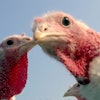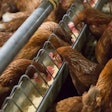The H7N9 and H5N1 avian influenza viruses continue to pose serious threats to human and animal health, and the risk will be elevated as the traditional flu season emerges, officials from the United Nations' Food and Agriculture Organization warned. The viruses and their threats were discussed September 16 during a joint meeting between the Food and Agriculture Organization (FAO), the United States Agency for International Development (USAID), the World Health Organization and the World Organisation for Animal Health.
"The world is more prepared than ever before to respond to bird flu viruses in light of a decade of work on H5N1 and the recent response to H7N9," Food and Agriculture Organization Chief Veterinary Officer Juan Lubroth said during the meeting.
"However, constant vigilance is required. Bird flu viruses continue to circulate in poultry. Efforts must continue and be strengthened, not only in affected countries, but also in neighboring states and areas with strong trade linkages. This is especially true for H7N9, since it causes no clinical signs in birds and is therefore very difficult to detect in poultry."
Heads of Food and Agriculture Organization Reference Centers, in Australia, the People's Republic of China, Italy and the United States of America were also in attendance, along with representatives from the Centers for Disease Control and Prevention and the United States Department of Agriculture.
Avian influenza surveillance of vital importance
FAO and USAID stress that more work is required. In the short term this includes continued, targeted surveillance and trace back throughout the production and marketing system, contingency planning and compensation scheme development.
In the longer-term fight against H7N9 and other viruses, Food and Agriculture Organization and United States Agency for International Development are urging countries to invest in improving the way they market and sell poultry.
FAO continues its call for funds to bolster the global H7N9 response. FAO is urging countries to make key investments in improving markets and promoting healthy food systems to fight viruses affecting animals and humans as part of overarching efforts to ensure the animal sector realizes its potential in the promotion of healthy and productive lives.
Funds committed to fight avian influenza
FAO has committed $2 million of emergency funding supplemented by more than $5 million from USAID to kick-start H7N9 response efforts. USAID support has enabled FAO to help countries at risk dramatically improve surveillance capacities.
"Several at-risk countries previously unable to pick up the virus can now accurately detect H7N9," explained Lubroth. "Identifying the virus with consistency is critical to targeting control efforts and reducing spread."


















